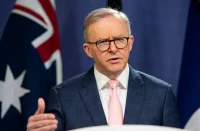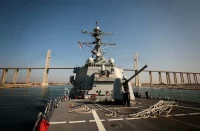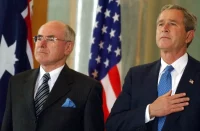After Al-Qaeda on the run, the violent emergence of borderless ‘Islamic State’, surfacing from the rubbles of conflict ridden parts of the Middle East, has now become a matter of deep concern for regional and international actors. Its ideological notations of ‘Khilafat’ has lost its universal appeal due its blood ridden strategic goals. Its brutal outlook has only appeased power starving ‘Sunni’ sect on limited scale in the region. And, its tactical methods to attain its ideological goals are being condemned even in moderate Sunni Islamic world.
Since the US invasion and the demise of Saddam, Iraq has never been able to find an all-inclusive political framework to rule the battle hardy land. The US backed Shia authoritative government failed to accommodate the Sunni minority sentiments. Sunnis after Saddam always considered Shias as usurpers who grabbed the power from them. This policy of exclusiveness further sharpened the divide and aggravated the sectarian hostilities at mass level. This divide gave much space to anti-state destabilizing actors. Under the flare of criticism, lately but rightly, the US has started responding to ISIS, outlining a broad strategic approach and rallying the international support to stop and eliminate the imminent danger to regional and international peace.
 The emergence of ISIS has continuously kept regional actors in a confounded situation. Saudi Arabia, a key player, will have a tough choice to gather support of moderate Sunnis within Iraq in the face of ISIS’ multifaceted objectives of anti-Americanism and anti-Shiaism. Al-Abadi, a Shia, under immense pressure from within and from the international community “to give Sunnis more regional authority and greater control over security forces” may also lose much of support from his Iranian counterpart who until now has shown much solidarity to counter the anti-state threats, whether on sectarian or moral grounds. Turkey has remained much cautious and is silently observing all these rapid developments immediate to its borders in the face of hostage crisis of its embassy in Iraq. Israel on the other hand does not consider ISIS as an imminent danger and is not much concerned over the expansionist ideology of ISIS on sectarian grounds, leaving its enemies bloodied and weakened.
The emergence of ISIS has continuously kept regional actors in a confounded situation. Saudi Arabia, a key player, will have a tough choice to gather support of moderate Sunnis within Iraq in the face of ISIS’ multifaceted objectives of anti-Americanism and anti-Shiaism. Al-Abadi, a Shia, under immense pressure from within and from the international community “to give Sunnis more regional authority and greater control over security forces” may also lose much of support from his Iranian counterpart who until now has shown much solidarity to counter the anti-state threats, whether on sectarian or moral grounds. Turkey has remained much cautious and is silently observing all these rapid developments immediate to its borders in the face of hostage crisis of its embassy in Iraq. Israel on the other hand does not consider ISIS as an imminent danger and is not much concerned over the expansionist ideology of ISIS on sectarian grounds, leaving its enemies bloodied and weakened.
Syrian crisis proved a blessing in disguise for the conflict torn Sunni minorities within Iraq to have some room and resources to capitalize their strategic gains by fading away state borders between Iraq and Syria, declaring a borderless state by denouncing the authority of the existing ones, and by announcing intentions of further expansion.
Obama administration has been severely and rightly criticized for its decision of immature withdrawal of the US forces leaving boots off the ground. But withdrawal alone is not the concluding factor; the entire war period, with boots on the ground, has left a question mark on the US war effort for the sake of peace and stability in modern history vis-à-vis its historical withdrawals from West Germany and Japan. After dethroning Saddam, the hesitant and sluggish shift of power to locals with many drawbacks of pick and choose from among the majorities to play with minorities have left little space for political maturity to develop, resulting in leaving long lasting impact on regional politics whose bitter fruit has now become visible in the form of ISIS.
Who is supporting ISIS?, is a question yet to answer. The impending answer can be self-reliant policy of ISIS squads by controlling the resources, oil being major part of these, and looting the state owned facilities including military bases. There are very low chances of state level foreign support due to its indistinct agenda and unjustifiable killings of minorities and outlanders.
With not much resistance at battle fronts, ISIS has shown astounding maturity towards tactical approach for incorporation of villages and towns into their circle of influence. Their achievements, though momentous, will certainly boost their morale to confront the “degrade and destroy” American strategy. The US and allies will certainly have a long and hard road to get to this strategy. After years of guerilla warfare, open confrontation will be a real test of ISIS’ combat potential. On the other hand US and Iraqi government have to regain their lost trust over Sunni masses giving a workable recipe of power sharing. Ironically, ISIS has not received much resistance from masses, rather many moderate Sunnis have deserted from state institutions due to indifference of Shia led government.
To see the outcome of “degrade and destroy” strategy, one has to wait but it is quite clear that ISIS will not be able to gather much moral support even from Sunni Islamic world. With the timely efforts to bring the mainstream Sunnis into constitutional and institutional framework, giving them regional autonomy over Sunni majority areas, can help securing mass support against ISIS reverting and degrading its successes.
Hasrat Ali Khan is the Research Analyst of Political Science at Government College University, Lahore.














Comments